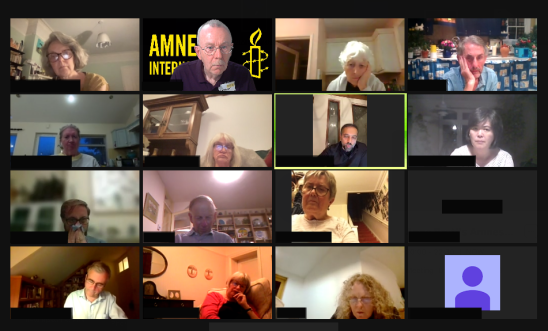
Hamad Al-Shamsi (UAE) - 5 September Meeting Highlights - Sutton Amnesty

Our Chair introduced Hamad Al-Shamsi, Executive Director of the Emirates Detainees Advocacy Center (EDAC). Hamad had been sentenced in absentia to 15 years imprisonment by the Federal Supreme Court in Abu Dhabi (UAE) on vague 'National Security' charges. He is, with our own Prisoner of Conscience, Dr Mohamed al-Roken, one of the UAE 94. Hamad was speaking to us from Turkey where he has been living in self-imposed exile.
The situation in UAE and the UAE 94
Hamad opened by emphasising that the UAE was not a democracy and that to talk of democracy would be viewed as an attempted coup. While there is freedom to speak to your neighbour, no such freedom exists when talking through wider media.
In March 2011 over a hundred Emirati (academics, lawyers and human rights defenders) petitioned the country's President for democratic reforms. In July 2012 a mass crackdown ensued with about 60 people arrested in one day for an attempted coup. Those arrested were kept in solitary confinement, sometimes for as long as a year. Neither they nor their families knew their location.
These actions were effected under the 'State Security Law’, which allows arrest for 90 days without charge but also allows this period to be extended. There is no recourse to appeal against this law.
Ninety four people ('the UAE 94') were tried in 2013 and most convicted and sentenced to imprisonment or (as in the case of Hamad) sentenced in absentia.
Hamad explained that the UAE authorities were good at 'collective punishment', extending restrictions to the wider family. So for example, his brothers and sisters are no longer allowed to leave the UAE and neither can his wife's parents. Other constraints used are removal of citizenship and restrictions on children, who may lose their citizenship unless the wife divorces her husband. This has happened.
Forty six people have completed their sentences but have remained imprisoned for further 'counselling'. Hamad gave the example of one imprisoned in 2014, given a three year sentence but still imprisoned five years later. They are unable to see any 'light at the end of the tunnel' and their positions are getting worse.
Hamad cited another case of Amina al-Abdouli, sentenced to five years ending in 2020, who managed to leak recordings about her mistreatment and consequently had her sentence extended.
Some have been released after 'acknowledging' their own guilt and thanking the UAE authorities.
Hamad believes one individual may have died in captivity without information being given to their family.
Hamad believes the UAE knows that the UAE 94 and others were not seeking to have the UAE Government overthrown. The authorities were however using the spectre of the Arab Spring to undermine petitions received.
Our Chair thanked Hamad for an excellent talk.
0 comments